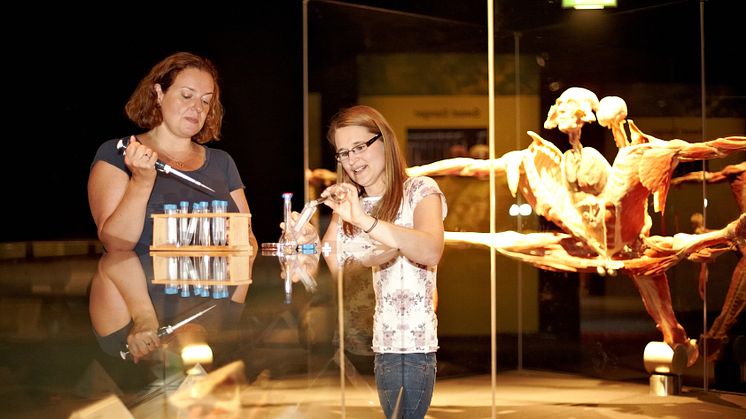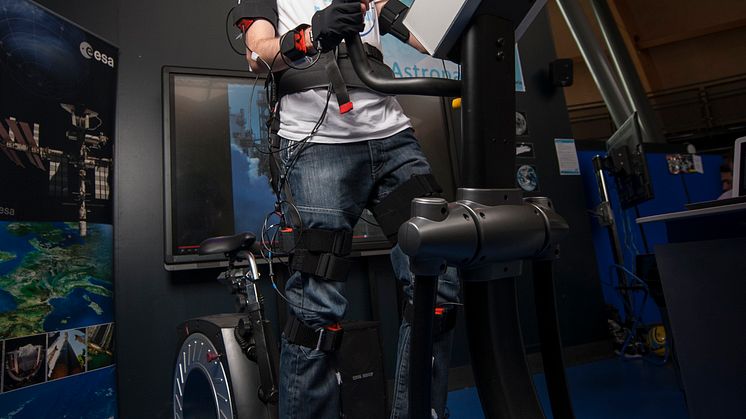
Press release -
Meet the scientists at Body Worlds
Northumbria University experts are showing how their research has the potential to help astronauts returning from space missions as well as assist in the fight against cancer and heart disease.
This summer, Northumbria academics are speaking to visitors to Newcastle’s Life Science Centre while it hosts the world-famous BODY WORLDS Vital exhibition.
The show, in the UK for the first time, brings together a collection of real human bodies and organs, willed by donors and preserved through plastination – a ground-breaking specimen preservation process invented by scientist Dr Gunther von Hagens. Vital tells the fascinating story of how best to fight life-threatening diseases such as cancer, diabetes and heart ailments, through healthy choices and lifestyle changes.
Throughout the course of the exhibition’s six-month stay in the city, Northumbria academics have participated in programmes of events, debates, lectures and have hosted ‘Meet the Scientist’ sessions, engaging with visitors as they walk through the exhibits.
Dr Sian Lawson, Senior Lecturer in Sports Coaching, and her team are currently working with the European Space Agency to find solutions to physiological problems suffered by astronauts when returning from long-term space missions.
They have showcased the motion capture and balance tests used to assess the musculo-skeletal system to visitors at Life Science Centre and are testing the Functional Readaptive Exercise Device (FRED) – a machine that may help astronauts as well as those with lower back pain by training local spinal and pelvic postural stability muscles.
 PhD student Andrew Winnard and biomechanics expert Robin Tahmosybayat are involved in this research. Andrew said: “The FRED device trains the muscles that help control a stable spine and pelvis during all types of normal daily movements. Astronauts often require rehab for these muscles after space missions.
PhD student Andrew Winnard and biomechanics expert Robin Tahmosybayat are involved in this research. Andrew said: “The FRED device trains the muscles that help control a stable spine and pelvis during all types of normal daily movements. Astronauts often require rehab for these muscles after space missions.
“While in space, astronauts float in microgravity for several months, not needing to use their postural muscles, which become smaller and weaker. This can lead to back pain and risks of prolapsed discs when they return to Earth and have to stand upright against gravity again. For this reason the European Space Agency has become a partner in the research.”
Visitors to BODY WORLDS Vital have been able to participate in this research by wearing motion capture equipment and performing various physical activities to provide physiological data.
Northumbria researchers have recorded over 100 people taking part in the motion capture exercise. The data collected will be analysed as part of a study into how posture changes between walking and exercising. When complete it will be one of the largest FRED studies to date.
Andrew added: “Doing real studies at the Life Science Centre is a great way to engage the public, both young and old, with real science while enabling easy access to large populations of varied participants.”
Dr Rosemary Bass, Senior Lecturer in Biomedical Sciences, has also led Meet the Scientist sessions. Her recent research focuses on how a protein called maspin affects cell behaviours that contribute to disease. This includes vascular cells and cancer cells of breast and prostate origin.
Dr Bass said: “During our sessions we have spoken to almost 400 people. We talk about how we use isolated human cells in our research to understand diseases, including heart disease and cancer. Children have got involved with our cell models and learnt about what’s inside them.
“It’s a way of getting people to talk about the body and the work scientists do. As a team of female scientists, our presence is also an opportunity to challenge the gender stereotype of scientists always being ‘men in white coats’.”
The academic involvement in Body Worlds Vital is part of a wider partnership between Northumbria University and Centre for Life that aims to engage the public with the world of science. Launched in March, the partnership sees the two institutions work together on public engagement events, research projects and the joint delivery of a new MSc Public Engagement with Science degree.
Visitors to Life Science Centre have more opportunities to ‘Meet the Scientists’, with Northumbria academics leading sessions in September, October and November.
To find out more information about the ‘Meet the Scientists’ sessions at the BODY WORLDS Vital exhibition, visitwww.life.org.uk
Topics
Categories
Northumbria is a research-rich, business-focussed, professional university with a global reputation for academic excellence. To find out more about our courses go towww.northumbria.ac.uk
If you have a media enquiry please contact our Media and Communications team at media.communications@northumbria.ac.uk or call 0191 227 4571.







